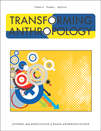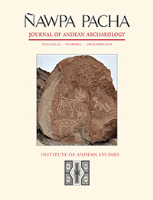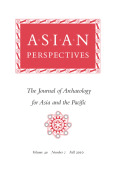
Revista Espanola de Antropologia Americana
Scope & Guideline
Engaging Minds in the Study of American Societies
Introduction
Aims and Scopes
- Cultural Anthropology and Ethnography:
The journal emphasizes qualitative research methodologies, including ethnography, to explore cultural practices, social structures, and community dynamics across various regions in the Americas. - Archaeological Studies:
It includes research on archaeological findings, interpretations of material culture, and historical contexts, shedding light on ancient civilizations and their legacies. - Political and Social Issues:
The journal addresses contemporary political and social issues faced by indigenous populations, including representation, identity, and activism, fostering discussions about decolonization and social justice. - Interdisciplinary Approaches:
Encouraging interdisciplinary research, the journal integrates perspectives from history, sociology, linguistics, and environmental studies to provide a comprehensive understanding of anthropological subjects. - Heritage and Memory:
The exploration of cultural heritage, memory practices, and the significance of historical narratives in shaping contemporary identities is a core focus area, often linked to indigenous rights and heritage preservation.
Trending and Emerging
- Indigenous Knowledge and Practices:
There is a marked increase in research focusing on indigenous knowledge systems, including their relevance in contemporary environmental and social contexts, emphasizing the importance of indigenous voices in global discussions. - Digital Anthropology:
Emerging themes in digital anthropology are gaining traction, with studies exploring the impact of technology on cultural practices, communication, and the preservation of indigenous heritage in the digital age. - Environmental Anthropology:
Papers addressing the intersection of anthropology and environmental issues, such as climate change, resource management, and indigenous ecological practices, are becoming increasingly prevalent, reflecting global concerns. - Gender Studies and Intersectionality:
The focus on gender dynamics, intersectionality, and the role of women in cultural practices and social movements is on the rise, highlighting the complexity of social identities within anthropological research. - Cosmopolitics and Multispecies Relations:
There is growing interest in cosmopolitical approaches and the relationships between humans and non-human entities, expanding the scope of anthropology to include multispecies perspectives and ecological interconnections.
Declining or Waning
- Colonial Studies:
Although still relevant, there has been a noticeable decrease in publications specifically focused on colonial studies, suggesting a shift towards contemporary issues affecting indigenous populations rather than historical colonial narratives. - Traditional Ethnographic Methods:
Papers employing traditional ethnographic methods without a contemporary twist or connection to current issues seem to be less frequent, indicating a movement towards more innovative and interdisciplinary methodologies. - Focus on Non-Indigenous Cultures:
Research centered on non-indigenous cultures and societies appears to be waning, as the journal increasingly prioritizes indigenous perspectives and experiences, reflecting a broader trend in anthropological scholarship.
Similar Journals

Revista de Arqueologia Historica Argentina y Latinoamericana
Connecting Cultures Through Archaeological DiscoveryRevista de Arqueologia Historica Argentina y Latinoamericana is a vital scholarly journal dedicated to the field of archaeology, with a particular focus on the historical dimensions of Argentina and Latin America. Published by the Assoc Professional Archaeologists Argentine Republic, this open-access journal has been enriching the archaeological discourse since 2007, making its valuable content freely accessible to researchers, professionals, and students around the globe. With an ISSN of 1851-3190 and an E-ISSN of 2344-9918, the journal aims to foster a deeper understanding of the archaeological heritage of the region by publishing innovative research articles, critical reviews, and methodological advancements in the study of historical archaeology. Positioned as a prominent platform for scholarship, it plays a crucial role in advancing archaeological knowledge while promoting interdisciplinary approaches within the field.

Boletin Antropologico
Connecting Scholars to the Heart of Human SocietyBoletin Antropologico, published by UNIV LOS ANDES, is a vital academic journal dedicated to the field of anthropology, focusing on the diverse cultural practices, social structures, and historical contexts of societies, particularly within Latin America. With its ISSN of 0257-750X, this journal aims to provide a platform for researchers and scholars to disseminate their findings and engage in meaningful discussions that advance the understanding of anthropological issues. Although Boletin Antropologico currently does not follow an open-access model, it remains a significant resource for professionals seeking peer-reviewed content that reflects rigorous academic standards. With a commitment to fostering intellectual growth and collaboration among anthropologists, the journal serves as an essential reference for students and practitioners keen on exploring the rich tapestry of human cultures and societies.

Cuadernos de Antropologia
Championing Diverse Perspectives in AnthropologyCuadernos de Antropología is a premier academic journal published by the University of Costa Rica, Faculty of Social Sciences, that has been contributing to the field of anthropology since 1983. With its commitment to Open Access, this journal ensures that research findings are readily available to a global audience, fostering collaboration and knowledge dissemination across various regions and disciplines. Although specific metrics like H-index or Scopus Rankings are not provided, the journal's long-standing history and accessibility underscore its importance in promoting anthropological research in Latin America and beyond. Covering a broad spectrum of topics within anthropology, Cuadernos de Antropología welcomes submissions from researchers, professionals, and students, aiming to enrich the academic landscape with diverse perspectives and innovative insights. Located in the heart of Costa Rica, the journal serves as a vital platform for advancing the understanding of cultural, social, and historical contexts that shape human behavior.

NAIS-Native American and Indigenous Studies Association
Fostering Critical Conversations on Indigenous KnowledgeNAIS-Native American and Indigenous Studies Association is a pivotal journal dedicated to the exploration and advancement of knowledge surrounding Native American and Indigenous studies. Published by University of Minnesota Press, this journal offers a platform for interdisciplinary scholarship that prioritizes Indigenous voices and perspectives across a variety of contexts. Although it operates under a traditional access model, the journal remains committed to disseminating high-quality research that challenges dominant narratives and emphasizes the importance of Indigenous knowledge systems. With a focus on contemporary issues, cultural practices, and historical insights, NAIS serves as an essential resource for researchers, professionals, and students passionate about Indigenous studies. Its aim is to foster critical conversations and promote understanding of Indigenous experiences in a rapidly changing world, thus fulfilling a vital role in academia and beyond.

Transforming Anthropology
Connecting Diverse Voices in Anthropological ResearchTransforming Anthropology is a dynamic and influential journal in the field of Anthropology, published by Wiley. With an ISSN of 1051-0559 and an E-ISSN of 1548-7466, this journal has established a reputable position within academic circles, evidenced by its impressive Q2 rating in the 2023 category quartiles and a 77th percentile rank in the Scopus Ranks for Social Sciences. Since its inception, the journal has evolved to reflect contemporary anthropological discourse, addressing crucial issues from diverse perspectives. Although it does not currently operate under an Open Access model, its content remains accessible to a global readership eager to engage with pioneering research. Spanning converged years from 1990 to 1994 and 2010 to 2024, Transforming Anthropology serves as a vital platform for exploring transformative ideas and methodologies within the discipline. Researchers, professionals, and students alike can benefit from the scholarly contributions and insightful discussions fostered within its pages, making it an essential resource for anyone invested in the complexities of human culture and society.

Nawpa Pacha
Exploring the Depths of Heritage and Innovation.Nawpa Pacha, a prestigious journal published by Taylor & Francis Ltd, stands as a significant platform for advancing research in Archaeology within the fields of Arts and Humanities. Since its inception in 2019, it has rapidly established itself with an impressive impact, evidenced by its categorization in the Q1 quartile for Archaeology and its significant rankings—placing it at Rank #88 in the Arts and Humanities category and Rank #86 in the Social Sciences. Published in the United Kingdom, the journal aims to foster interdisciplinary dialogue and promote scholarly work that contributes to the understanding of archaeological heritage and practices. Researchers, professionals, and students alike will find this journal indispensable for disseminating innovative methodologies, theoretical frameworks, and case studies that push the boundaries of archaeological inquiry. Whether seeking to explore historical narratives or contemporary archaeological challenges, Nawpa Pacha serves as a vital resource in the ever-evolving landscape of archaeological research.

Southern African Humanities
Advancing knowledge in Southern African cultures.Southern African Humanities is an esteemed academic journal published by the Natal Museum, dedicated to advancing the fields of anthropology, archaeology, and cultural studies with a particular focus on the Southern African context. Since its inception in 2008, the journal has consistently provided a platform for innovative research and scholarly discourse, earning a prominent reputation with a 2023 impact factor that places it in the Q2 and Q1 quartiles across multiple relevant categories, including Anthropology, Archaeology, and History. The journal is recognized for its rigorous peer-review process and dissemination of high-caliber research, exemplified by its Scopus rankings, which reflect its widespread influence within the humanities. Although it does not currently offer open access options, the journal remains pivotal for researchers, professionals, and students aiming to deepen their understanding of Southern African cultures and historical contexts. Located in Pietermaritzburg, South Africa, Southern African Humanities continues to be an essential resource for those engaged in the humanities, enhancing knowledge and fostering research collaborations within the region and beyond.

Asian Perspectives-The Journal of Archaeology for Asia and the Pacific
Fostering Dialogue: Insights into Asia and the Pacific's Rich TapestryAsian Perspectives - The Journal of Archaeology for Asia and the Pacific is a prestigious journal published by University of Hawaii Press, focusing on the intricate field of archaeology in Asia and the Pacific. With a rich publication history dating back to 1993, the journal has established itself as a vital platform for disseminating research that illuminates the archaeological heritage and cultural dynamics of this diverse region. Recognized for its scholarly impact, it enjoys a commendable impact factor and ranks in the Q2 category for Anthropology and Archaeology, indicating its significant contribution to these fields. Although it operates on a traditional subscription-based model, the journal is accessible to institutional and individual subscribers worldwide. With an emphasis on interdisciplinary research, Asian Perspectives invites contributions that foster a deeper understanding of historical and contemporary issues through archaeology, making it an invaluable resource for researchers, professionals, and students alike committed to advancing scholarly dialogue in the region. Explore a wealth of innovative studies and insights that continue to shape the understanding of Asia and the Pacific's archaeological narrative.

Boletin de Arte-UMA
Exploring the Nexus of History and ArtBoletin de Arte-UMA is a distinguished academic journal published by the University of Malaga, Department of History of Art, focusing on the rich interplay between history, visual arts, and performing arts. Operating under an Open Access model since 2013, this journal ensures that valuable research is freely available for scholars and practitioners worldwide. With an impact factor currently reflecting its academic rigor through its Q2 ranking in History and Q1 ranking in Visual Arts and Performing Arts, Boletin de Arte-UMA serves as a vital platform for cutting-edge research, critical analysis, and the promotion of cultural heritage studies. Based in Malaga, Spain, the journal not only provides insights into its thematic scope but also fosters a global dialogue among researchers, professionals, and students passionate about the visual and performing arts.

Annual Review of Anthropology
Transforming Research into UnderstandingAnnual Review of Anthropology is a premier journal published by Annual Reviews, dedicated to providing comprehensive and authoritative reviews in the field of anthropology. Established with the goal of synthesizing essential research findings, this influential publication not only shapes contemporary anthropological discourse but also facilitates interdisciplinary dialogue within the broader realm of social sciences and cultural studies. With an impressive impact factor that places it in the Q1 category across multiple classifications, including Anthropology and Arts and Humanities, this journal is highly regarded by researchers and academics alike. The Annual Review of Anthropology has been a trusted resource for critical insights and transformative ideas, helping to advance the understanding of human societies from 1980 to the present. Although it does not offer open access, access to its articles is available through various academic institutions, ensuring that both seasoned scholars and students can benefit from its wealth of knowledge. With a Scopus ranking placing it in the top percentiles for relevant subjects, this journal is essential reading for anyone looking to stay at the forefront of anthropological research.